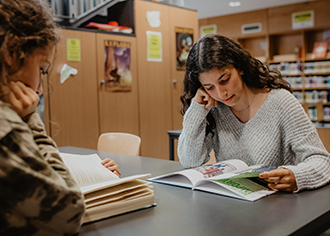ISF Middle School offers a challenging, structured, and well-rounded program using the SABIS® Educational System. Students completing the Middle School curriculum at ISF will have a mastery of the basic concepts and core knowledge required for High School. Beyond academics, students are encouraged to participate in a highly diverse and engaging arts and sports program.
Curriculum
The curriculum of the ISF Middle School emphasizes academic and personal growth. The academic coursework is integrated, sequential, and age-appropriate in skills, knowledge, and values. Academic objectives include providing a well-rounded education based on a mastery of English, German, and math and training students in logical reasoning and critical thinking while generating excitement for lifelong learning.
Weekly classes in art, music, computing, and P.E. complete the curriculum in the ISF Middle School. Offering students a liberal arts education, these classes encourage students to develop as well-rounded individuals. Student talent is showcased throughout the year through art exhibitions, concerts, and numerous sporting events.
English
The ability to communicate effectively is an essential skill in today’s world. Our English program aims to prepare and help students be articulate communicators, proficient readers, and powerful writers.
In grades 5 to 8, students are exposed to various genres of literature, ensuring students become confident readers and writers who use the critical thinking skills of the effective communicator as they explore new texts.
At this stage, students are encouraged to respond to layers of meaning and appreciate a wide range of authors and genres, becoming more aware of the techniques of writing for effect within each of those genres. The curriculum provides opportunities for students to become independent learners through homework tasks and independent projects.
Intensive English
Intensive English classes are offered throughout the Middle School for non-native speakers of English to assist them in the mastery of the fundamentals of English and progress into native speaker level.
Math
Math is a universal "language" that is critical for success in all walks of life. At ISF, our Math program aims to help students develop ability for mathematical thinking and an appreciation of the power and use of mathematics in the real world.
The Middle School Math curriculum at ISF helps students attain an understanding of mathematical concepts and master computational skills and problem-solving techniques that will enable them to understand the more abstract concepts in higher grades. Starting in Grade 7 students are taught algebra. In Grade 8, the study of algebra is continued along with the study of geometry.
Students in these grades will:
- Learn to manipulate real numbers with ease, working with fractions, percentages, ratios and proportions
- Begin basic algebra (variables and algebraic expressions as well as solving equations)
- Graph ordered pairs in a coordinate plane
- Use formulas to solve word problems about area, perimeter, and volume of shapes
- Work with lines, angles, types of triangles, and other basic geometric shapes
Science
The science curriculum at ISF offers students varied opportunities to become involved with basic scientific concepts, process-oriented techniques, and challenging problems for investigation. For grades 5 to 8, the program creates a smooth transition to the upper school years by weaving U.S. state outcomes with other external examination requirements to meet the needs of the international body of SABIS® schools.
This program helps students sharpen their various descriptive, experimental, quantitative, and conceptual abilities spanning the fields of biology, earth and space, physics, and chemistry. By the end of this stage, students will have a solid foundation to build on as they move into the high school program.
Science is also offered as a survey course is offered at ISF in grades 7-8. Students in these grades focus on the study of life, earth, physical sciences, and mathematical methods.
Computing
Students at this stage will transform ideas and concepts to finished products using a variety of advanced features in computing.
The wider range of skills introduced to students will include information manipulation, organization, and presentation. Students will use spreadsheets, organizers, electronic presentations, and reports to collect, manipulate, organize, and present information related to various issues of concern. Advanced topics related to word processing, spreadsheets, and presentations are mastered at this phase.
Block programming is also covered in this levels range. Students will learn how to create objects and programmable characters.
Social media and networks, ethical and responsible use of the Internet, using emails, and online safety are covered intensively in these levels. Students will learn how to browse the Internet, download material, send and receive emails, and apply safety measures when using the Internet.
At the end of this phase, students will be introduced to different computer science topics such as artificial intelligence, robotics, cryptography, mobile applications, virtual and augmented realities, and 3D printing.
Finally, students will encounter new computing activity venture—namely, high-level programming. The purpose of programing is to enforce critical thinking and problem-solving skills that are essential to the next stage—the pre-university stage.
Social Studies
The social studies curriculum in the ISF Middle School builds upon students' understanding of topics most familiar to themselves, their families, and their communities. As students' environments expand, studies include geography and world history with local German content. Map and globe skills, the use of charts and graphs, chronology, critical thinking, and research are some of the components in the integrated-skills approach to social studies in the Middle School.
Grades 7-8 at ISF focus on the study of history from ancient civilizations to the 20th century. Students gain knowledge and understanding of these time periods through the texts used. Project work in each term allows the students to further explore areas of special interest. Additionally, local German content in history, politics, and institutions is integrated into German lessons in grades 7-8.
By the end of the program, students are able to:
- Use maps, charts, and diagrams to explore their world
- Understand the physical features of Earth
- Describe the impact of humans on their geography, and vice versa
- Compare and contrast different ancient civilizations
German
The German program in the ISF Middle School is a two-track system comprised of German for native speakers and German as a foreign language. German is required for students at all grade levels in the Middle School. Both programs provide the students with a solid background in grammatical structures, vocabulary, spelling, and writing skills. The native-speaker German course integrates the study of classical German literature starting in Grade 7.
Students new to Germany and the German language are typically able to communicate fluently in the language after three or four years in the ISF Middle School German program.
Other World Languages
A choice of French or Spanish is offered to students in Grade 6 as an additional world language. Native Korean language classes are available to students from Grade 1 to 12.
Visual Arts
The art program allows students to take their own experiences of the world and transform them into artistic forms.
Students will learn to:
- Identify and describe different forms of traditional and contemporary visual arts, cultivating perception, the imaginary, the ability to symbolize, and the image-repertoire.
- Explore and recognize visual elements of art—point, line, shape, color, space, and movement, among others.
- Recognize and analyze how different aesthetic and cultural matrices influence visual arts in the artistic manifestations of local, regional, and national cultures.
- Experiment with different forms of artistic expression—drawing, painting, collage, comics, paper folding, sculpture, modeling, installation, video, photography, among others— making sustainable use of conventional and unconventional materials, instruments, resources, and techniques.
- Create visual arts individually, collectively, and collaboratively, exploring different spaces of the school and the community.
- Research, identify, and analyze different forms of traditional and contemporary visual arts in works by national and foreign artists from different eras and in various aesthetic and cultural matrixes, in order to expand the experience within diverse visual contexts and artistic practices.
Music
The ISF Music Department offers students in Kindergarten through Grade 12 a context within which to develop their understanding and love for music.
In Grades 5 - 7, ISF students have the chance to choose between band, chorus, or string ensembles. Grades 5-7 have weekly rehearsals and grade 8 rehearses twice a week. These ensembles are showcased at performances twice per year.
Music ensembles and instruction on instruments such as guitar, keyboard, brass, woodwinds, strings, or vocal ensemble are offered as part of the SLO® activity schedule to give more students the chance to play or sing.
Physical Education
Information Coming Soon.
Learn more about our Middle School program here.






